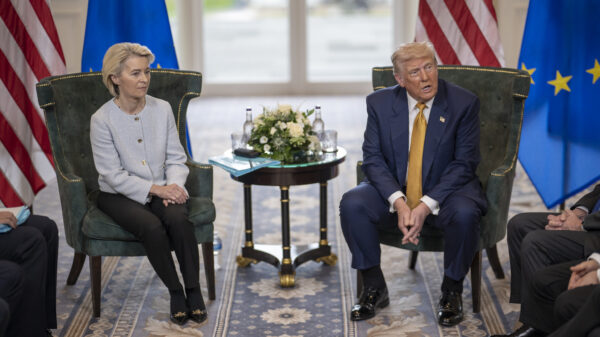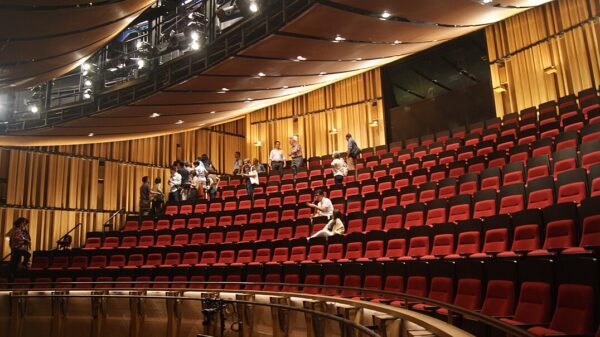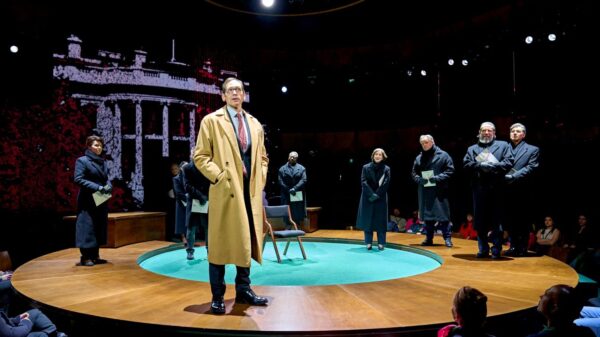Staff Writer Marko Blanusa reflects on his mixed experiences with the National Theatre’s ‘Coriolanus’, arguing that, despite the play’s enduring relevance, the production lost some of its thematic momentum.
Before I begin, I must confess that I am not extremely knowledgeable about Shakespeare’s works, aside from a brief stint of GCSE English analysis of Macbeth. I went into this production with cautious optimism. On the one hand, I realised my inexperience with listening to Shakespeare’s dialogue may keep me at a distance from the characters; on the other, I knew that the National Theatre must have put a lot of thought into the adaptation, especially since ‘Coriolanus’ hasn’t been put on in London since 2014. Luckily, the latter proved to be the case for the most part and I left the theatre feeling satisfied.
The standout element of the production has to be the staging. The set (designed by Es Devlin) is made up of multiple pillars with LED screens which rise and fall to reveal new spaces and secrets hidden amongst them. What I found most unique was the use of camera crews neatly worked into the story. Their filming of key moments which were projected onto the screens in real time, really elevated the drama by portraying the characters as larger than life. It is not the sort of thing you would expect in a Shakespeare’s adaptation, but remains extremely exciting to watch nonetheless. It heightens the pressure of the scrutiny that Coriolanus (played by David Oyelowo) finds himself under, while also magnifying all of his scornful behaviour towards the people of Rome. This makes the people’s anger all the more justifiable when you see that he doesn’t only spite them behind closed doors, but also in a live broadcast scenario.
I must also commend the incredible fight choreography which comes in the first half of the production. Stellar sound and lighting design is used to switch seamlessly from quick, stylish sword fighting to brutal slow motion. Having this so early in the play really highlights Coriolanus’ prowess as a warrior. It allows us to understand exactly why he is so reluctant to take public office: we clearly see that he feels most comfortable on the battlefield. So many of these elements feel as though director Lyndsey Turner had thought: “What can we do at the Olivier Theatre that they can’t at The Globe?”. The production makes use of so many captivating and unique modern innovations that they alone justify the price of entry.
That is to say, my issues lie more with the execution of the story. The beats of Shakespeare’s work remain intact and they certainly make for an exciting political drama on the surface. However, scratch beneath it and you’ll find that it is less thematically rich than you would expect from such a production. This is mostly to do with the direction of the actors. While the lack of soliloquies does make it harder to understand the state of mind of the characters compared to other Shakespeare plays, it generally seems like Turner isn’t sure of how she wants to present them in the first place. In this adaptation, Coriolanus is difficult to pin down. He is supposed to be an anti-hero, warning us of the dangers of populism and adoring leaders who do not care for us. The modern elements in the staging and costumes certainly indicate that Turner wants us to connect Coriolanus’ behaviour to that of today’s populist politicians. However, I struggled to see that, given Oyelowo’s delivery and posture too often came off as socially awkward rather than actively disdainful. Rather then being seduced into following Coriolanus and then repelled with his heartless deeds, I often felt simply bad for him. Still, Oyelowo gives a strong performance, doing the best he can from what seems like a rather vague set of directions.

Photo credit: Misan Harriman
The side characters also act in ways that sometimes appear odd. This is particularly true of the Tribunes Brutus and Sicinius (played by Jordan Metcalfe and Stephanie Street), whose disdain of Coriolanus’ ‘pride’ feels overblown when he looks more like a confused soldier struggling to accept public duties than a conniving megalomaniac. Furthermore, the complex, distant relationship between Volumnia (Coriolanus’ mother played by Pamela Nomvete) and her son is not really explored – this is a shame given how important she is to the plot, especially in the second half. When taken at face value, this version of Shakespeare’s story is still relatively fast-paced and full of twists and turns, but such details make it harder to get fully immersed in the play.
The modern aesthetic of the production certainly seems deliberate, as though Turner wanted to draw a parallel between populism of Shakespeare’s imagination and the kind we see today. The artefacts scattered around the stage remind us that what is now history was once the present. These people and objects may now seem distant and irrelevant, but the past has a story to tell – and we must heed its warnings. It’s a shame those themes do not resonate more strongly. Nonetheless, the National Theatre’s production leaves a strong impression – even if it requires suspension of disbelief from time to time to engage with it fully.



















